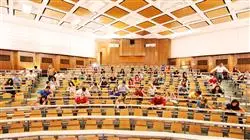University certificate
The world's largest faculty of humanities”
Introduction to the Program
Delve into the assumptions and sources of theological knowledge to develop critical thinking in the face of Christian discourse”

In this Professional master’s degree in Dogmatic Theology there will be a group of experts trained to provide all the criteria that allow students to update in this area of study in a comfortable way. For this purpose, the program has a rich study plan that will begin by exposing the historical and epistemological configuration of Theology as a science. At this point, the justification of the documentation that the doctrine takes to validate its statements will be presented.
Throughout the program, Fundamental Theology will be presented as a specialized part of this science that tries to understand the mystery of God in its totality. In this way, the Christian message will be explained, presenting the reasons that justify the yes of faith to the divine revelation, to the person and to the message of Jesus Christ.
Thanks to the above, the student will begin to develop critical thinking to explain the formal theological principles involved in the scientific reading of Sacred Scripture: canonicity, inspiration and inerrancy. As a result, they will be able to generate a dialogue between the approaches of the church and today's society. At the end of the program, students will have acquired specific knowledge that will allow them to base their ideas on Christian hope on the eschatological notions that come from Sacred Scripture, especially from the affirmations on the resurrection of Christ.
In this way, the student will be able to answer modern questions and concerns and, at the same time, will be able to present conclusions about them. For this reason, the program represents an excellent opportunity for those who wish to have an active presence in the academic, teaching or research field.
Justifies the hope of the ecclesial community by valuing human life in its historical dimension on the basis of the Christian doctrine on eternal life”
This Professional master’s degree in Professional master’s degree contains the most complete and up-to-date program on the market. Its most notable features are:
- The development of case studies presented by experts focused on Dogmatic Theology
- The graphic, schematic and eminently practical contents of the book provide epistemological and practical information on those disciplines that are essential for professional practice
- Practical exercises where self-assessment can be used to improve learning
- Special focus on innovative methodologies for the study of Dogmatic Theology
- Theoretical lessons, questions to the expert, debate forums on controversial topics, and individual reflection assignments
- Content that is accessible from any fixed or portable device with an Internet connection
It develops a sensitivity to the great theological and spiritual questions that are manifested in the great theological tradition of the Church”
The program’s teaching staff includes professionals from the sector who contribute their work experience to this training program, as well as renowned specialists from leading societies and prestigious universities.
Its multimedia content, developed with the latest educational technology, will allow the professional a situated and contextual learning. In other words, a simulated environment that will provide immersive education programmed to prepare for real situations.
This program is designed around Problem-Based Learning, whereby the professional must try to solve the different professional practice situations that arise throughout the program. For this purpose, the student will be assisted by an innovative interactive video system created by renowned and experienced experts.
With this program, you will gain an understanding of the importance of Mary of Nazareth in the mystery of Christ and the church”

Debate and argue about contemporary views on creation, man and sin”
Why study at TECH?
TECH is the world’s largest online university. With an impressive catalog of more than 14,000 university programs available in 11 languages, it is positioned as a leader in employability, with a 99% job placement rate. In addition, it relies on an enormous faculty of more than 6,000 professors of the highest international renown.

Study at the world's largest online university and guarantee your professional success. The future starts at TECH”
The world’s best online university according to FORBES
The prestigious Forbes magazine, specialized in business and finance, has highlighted TECH as “the world's best online university” This is what they have recently stated in an article in their digital edition in which they echo the success story of this institution, “thanks to the academic offer it provides, the selection of its teaching staff, and an innovative learning method aimed at educating the professionals of the future”
A revolutionary study method, a cutting-edge faculty and a practical focus: the key to TECH's success.
The most complete study plans on the university scene
TECH offers the most complete study plans on the university scene, with syllabuses that cover fundamental concepts and, at the same time, the main scientific advances in their specific scientific areas. In addition, these programs are continuously being updated to guarantee students the academic vanguard and the most in-demand professional skills. In this way, the university's qualifications provide its graduates with a significant advantage to propel their careers to success.
TECH offers the most comprehensive and intensive study plans on the current university scene.
A world-class teaching staff
TECH's teaching staff is made up of more than 6,000 professors with the highest international recognition. Professors, researchers and top executives of multinational companies, including Isaiah Covington, performance coach of the Boston Celtics; Magda Romanska, principal investigator at Harvard MetaLAB; Ignacio Wistumba, chairman of the department of translational molecular pathology at MD Anderson Cancer Center; and D.W. Pine, creative director of TIME magazine, among others.
Internationally renowned experts, specialized in different branches of Health, Technology, Communication and Business, form part of the TECH faculty.
A unique learning method
TECH is the first university to use Relearning in all its programs. It is the best online learning methodology, accredited with international teaching quality certifications, provided by prestigious educational agencies. In addition, this disruptive educational model is complemented with the “Case Method”, thereby setting up a unique online teaching strategy. Innovative teaching resources are also implemented, including detailed videos, infographics and interactive summaries.
TECH combines Relearning and the Case Method in all its university programs to guarantee excellent theoretical and practical learning, studying whenever and wherever you want.
The world's largest online university
TECH is the world’s largest online university. We are the largest educational institution, with the best and widest online educational catalog, one hundred percent online and covering the vast majority of areas of knowledge. We offer a large selection of our own degrees and accredited online undergraduate and postgraduate degrees. In total, more than 14,000 university degrees, in eleven different languages, make us the largest educational largest in the world.
TECH has the world's most extensive catalog of academic and official programs, available in more than 11 languages.
Google Premier Partner
The American technology giant has awarded TECH the Google Google Premier Partner badge. This award, which is only available to 3% of the world's companies, highlights the efficient, flexible and tailored experience that this university provides to students. The recognition as a Google Premier Partner not only accredits the maximum rigor, performance and investment in TECH's digital infrastructures, but also places this university as one of the world's leading technology companies.
Google has positioned TECH in the top 3% of the world's most important technology companies by awarding it its Google Premier Partner badge.
The official online university of the NBA
TECH is the official online university of the NBA. Thanks to our agreement with the biggest league in basketball, we offer our students exclusive university programs, as well as a wide variety of educational resources focused on the business of the league and other areas of the sports industry. Each program is made up of a uniquely designed syllabus and features exceptional guest hosts: professionals with a distinguished sports background who will offer their expertise on the most relevant topics.
TECH has been selected by the NBA, the world's top basketball league, as its official online university.
The top-rated university by its students
Students have positioned TECH as the world's top-rated university on the main review websites, with a highest rating of 4.9 out of 5, obtained from more than 1,000 reviews. These results consolidate TECH as the benchmark university institution at an international level, reflecting the excellence and positive impact of its educational model.” reflecting the excellence and positive impact of its educational model.”
TECH is the world’s top-rated university by its students.
Leaders in employability
TECH has managed to become the leading university in employability. 99% of its students obtain jobs in the academic field they have studied, within one year of completing any of the university's programs. A similar number achieve immediate career enhancement. All this thanks to a study methodology that bases its effectiveness on the acquisition of practical skills, which are absolutely necessary for professional development.
99% of TECH graduates find a job within a year of completing their studies.
Professional Master's Degree in Animal-Assisted Therapies
Animal-assisted therapies are an alternative treatment for people suffering from certain psychological conditions such as anxiety, depression or phobias. Currently, dogs, horses and some farm animals are being of great help in creating synergistic and balanced relationships that help people to overcome various conditions. In this sense and aware of the high degree of effectiveness of animal-assisted interventions, TECH Global University has designed the Professional Master's Degree in Animal-Assisted Therapies that aims to instruct psychologists in the correct ways that facilitate the design and implementation of this type of therapies, always taking care of the patient's welfare, as well as that of the animal. The postgraduate program has a team of highly trained professionals with extensive experience in the field of health and therapy. This program offers a complete specialization, covering topics such as animal anatomy and physiology, ethology and animal behavior, intervention techniques in animal-assisted therapy, among others. Among the areas of specialization of the program are assisted therapy with dogs, horses and dolphins. In addition, the use of animals in education and psychosocial rehabilitation is also addressed.
Do you want to work in the best Assisted Therapy hospitals?
This Professional Master's Degree offers great employment advantages, because upon completion, students will be able to work in clinics and hospitals, animal-assisted therapy associations, social and educational entities, among others. In addition, they will be able to develop their own intervention project in animal-assisted therapy, applying the knowledge acquired in the program. In short, the Professional Master's Degree in Animal Assisted Therapy is a complete and specialized academic program in the field of health and therapy, which offers quality theoretical and practical preparation, with the objective of training professionals committed to the welfare of people and animals. Enroll in TECH and pursue your professional dreams!







